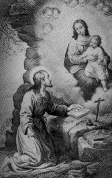Soldiers of Christ
On this the feast of St. Ignatius of Loyola it seems appropriate to draw attention to an article from Our Sunday Visitor which reports on a shortage of Catholic millitary chaplains in US defence force and the vulnerability of Catholic soldiers to proselytizing by evangelicals. Despite Catholic soldiers representing 27 per cent of defence personnel, Catholic priests represent only 7 per cent of chaplains, which means many soldiers are not able to receive the sacraments or support. The situation is made worse by soldiers not having a solid foundation in the faith to be able to defend their beliefs and practices from the criticism of non-Catholics.
On a different note, a quotation from The Spirit of St. Ignatius by Fr. de Franciosi:
"The Protestants in Germany, having tried in vain to obtain the admission of one of their emissaries into the Society, upon whom they had counted much, to manage intellects, and to cause their doctrines to penetrate them insidiously, tried other mean, with no greater success. This was, to send from Venice to the Professed House in Rom, from an unknown person, under pretext of a gift, two large boxes of books calculated to poison youth. The cases arrived, and were placed in the library. Father Oliver Manare having opened them, found that the books at the top of the boxes were orthodox, but that those underneath were heretical. He told the Father Minister, Everard Mercurian, who also examined them, and ascertained that the greater number of these books were by Luther, Melancthon, and other sectaries. It was reported to Ignatius, who, recognising immediately whence such liberality proceeded, ordered all the books to be burnt; he even had the ashes thrown to the winds as if he feared that they might infect the house."
The actions of St. Ignatius in having heretical books burnt are consistent with this advice :
"All that proceeds from heretics should be suspected, especially books, however good they may be. When one reads a good book by a bad man, one is insensibly drawn towards the author, sometimes even so far as to think all that he has written to be reasonable and orthodox."
Finally a quotation which has some bearing on the present state of the Church, its liturgy and some might even say his own order:
"Ignatius would not allow any one, without his knowledge, to alter the practices in force, under pretext of removing any inconvenience or introducing an amendment. He was aware that a person who enter this path does not stop, and that to succeed in introducing one change is an encouragement to endeavour to obtain the acceptance of another. When authority yields thus on one point, everything may at any moment be called in question, and henceforth there is no longer anything stable, to great detriment of a religious body, above all if it is still in its beginning ... 'If I were to live for a thousand years', he used often to say, 'I would never cease repeating, No novelties in theology, philosophy, logic, nor even in teaching grammar.'"

